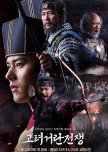Cette critique peut contenir des spoilers
A captivating look into the intricacies of war, wrapped in the charm of old-school sageuk
Plot/Story:
The Goryeo-Khitan War begins with the crucial Battle of Kwiju, a key conflict during the Third Goryeo-Khitan War in 1019. The narrative then rewinds a decade to provide context for the second war between the Khitan-led Liao dynasty and the Goryeo dynasty. Set against the backdrop of the Third Goryeo-Khitan War, the series meticulously explores the tensions throughout the Second and Third Khitan invasions. It also depicts the challenges Goryeo faced following the Second invasion and how the dynasty united to face the impending attacks from the Khitans.
The drama, despite containing some anachronisms, is still mindful of historical accuracy. These anachronisms enrich the narrative, emphasizing the importance of national unity and adding some edges to otherwise perfect characters. This approach can slow the pace, making it feel somewhat dragging. However, with patience, the payoff is quite satisfying. Even with these minor modifications, the series stays close to historical truth (based on my research on Wikipedia and Google) and kept me engrossed in a world of politics and impending conflicts, and even kept me at the edge of my seat despite knowing the outcome.
At its heart, the Goryeo Khitan War is about human strength during war. It deeply explores reactions to conflict and political plans linked to war. It shows power struggles, ambitions, alliances, and betrayals that affect the outcome of battles. It also focuses on how characters grow through these challenges and how this changes their perspectives on life and humanity.
Character and Relationship:
Just like in most traditional sageuks, politics, court intrigues, and epic battles take center stage in this drama. However, the true stars of the show for me were the characters and their very human stories. King Hyun Jong, who evolved from a naive figure into a powerful leader under the mentorship of Gang Gam-chan, is a character that I found endearing. Their bond forms the pulsing beat of the show, symbolizing the perfect dynamic between a king and his minister. It's all about loyalty, reciprocal appreciation, immense capability, and heaps of trust.
Yang Kyu's character strikingly portrayed the harsh realities of war and the steep price of victory, which deeply resonated with me. His struggle against adversity and his spirit in the face of overwhelming odds painted a vivid picture of the human cost of war and the sacrifices made for victory. One thing to note is that since this is a war drama, female characters mostly occupy peripheral roles, yet thanks to the superb performances and concise writing, they still resonate as vivid and authentic. I particularly appreciate the portrayal of the enduring marriage between Gang Gam Chan and his wife, and how, despite decades of marriage and constant bickering, her unwavering loyalty shines through.
Acting/Cast:
The cast, packed with familiar faces and veteran actors, brought their A-game to this sageuk. Choi Soo Joon's portrayal of Gang Gam-chan is impeccable, as expected from the King of Sageuk. His performance captured Gam-chan's essence in a way that was both captivating and genuine. I was also impressed by Kim Dong Jun's portrayal of King Hyun Jong. His transition from uncertainty to authority was smooth and convincing, embodying the regal air of a king as his character evolved. But the real standout for me was Ji Seung Hyun. His portrayal of Yang Gyu tugged at my heartstrings. He encapsulated the harsh realities and raw emotions associated with this historical event, painting a vivid picture of not just the physical struggles, but also the emotional turmoil faced by the characters.
In summary, to me, "Goryeo-Khitan War" is more than just a historical drama. It's a captivating exploration of personal growth, power struggles, and the intricacies of war and politics, all wrapped in the charm of old-school sageuk. Unlike many modern sageuks targeting younger audiences, or those blending with fusion sageuk subgenres, this drama is a refreshing change of pace. It stays true to its style and prioritizes historical accounts over romance or fantasy. If you're a fan of classic sageuk, this is one for your watchlist.
The Goryeo-Khitan War begins with the crucial Battle of Kwiju, a key conflict during the Third Goryeo-Khitan War in 1019. The narrative then rewinds a decade to provide context for the second war between the Khitan-led Liao dynasty and the Goryeo dynasty. Set against the backdrop of the Third Goryeo-Khitan War, the series meticulously explores the tensions throughout the Second and Third Khitan invasions. It also depicts the challenges Goryeo faced following the Second invasion and how the dynasty united to face the impending attacks from the Khitans.
The drama, despite containing some anachronisms, is still mindful of historical accuracy. These anachronisms enrich the narrative, emphasizing the importance of national unity and adding some edges to otherwise perfect characters. This approach can slow the pace, making it feel somewhat dragging. However, with patience, the payoff is quite satisfying. Even with these minor modifications, the series stays close to historical truth (based on my research on Wikipedia and Google) and kept me engrossed in a world of politics and impending conflicts, and even kept me at the edge of my seat despite knowing the outcome.
At its heart, the Goryeo Khitan War is about human strength during war. It deeply explores reactions to conflict and political plans linked to war. It shows power struggles, ambitions, alliances, and betrayals that affect the outcome of battles. It also focuses on how characters grow through these challenges and how this changes their perspectives on life and humanity.
Character and Relationship:
Just like in most traditional sageuks, politics, court intrigues, and epic battles take center stage in this drama. However, the true stars of the show for me were the characters and their very human stories. King Hyun Jong, who evolved from a naive figure into a powerful leader under the mentorship of Gang Gam-chan, is a character that I found endearing. Their bond forms the pulsing beat of the show, symbolizing the perfect dynamic between a king and his minister. It's all about loyalty, reciprocal appreciation, immense capability, and heaps of trust.
Yang Kyu's character strikingly portrayed the harsh realities of war and the steep price of victory, which deeply resonated with me. His struggle against adversity and his spirit in the face of overwhelming odds painted a vivid picture of the human cost of war and the sacrifices made for victory. One thing to note is that since this is a war drama, female characters mostly occupy peripheral roles, yet thanks to the superb performances and concise writing, they still resonate as vivid and authentic. I particularly appreciate the portrayal of the enduring marriage between Gang Gam Chan and his wife, and how, despite decades of marriage and constant bickering, her unwavering loyalty shines through.
Acting/Cast:
The cast, packed with familiar faces and veteran actors, brought their A-game to this sageuk. Choi Soo Joon's portrayal of Gang Gam-chan is impeccable, as expected from the King of Sageuk. His performance captured Gam-chan's essence in a way that was both captivating and genuine. I was also impressed by Kim Dong Jun's portrayal of King Hyun Jong. His transition from uncertainty to authority was smooth and convincing, embodying the regal air of a king as his character evolved. But the real standout for me was Ji Seung Hyun. His portrayal of Yang Gyu tugged at my heartstrings. He encapsulated the harsh realities and raw emotions associated with this historical event, painting a vivid picture of not just the physical struggles, but also the emotional turmoil faced by the characters.
In summary, to me, "Goryeo-Khitan War" is more than just a historical drama. It's a captivating exploration of personal growth, power struggles, and the intricacies of war and politics, all wrapped in the charm of old-school sageuk. Unlike many modern sageuks targeting younger audiences, or those blending with fusion sageuk subgenres, this drama is a refreshing change of pace. It stays true to its style and prioritizes historical accounts over romance or fantasy. If you're a fan of classic sageuk, this is one for your watchlist.
Cet avis était-il utile?














